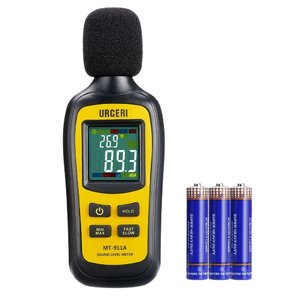Just to add: I've used a standard A/C sound meter and the readings seemed much lower than using the NIOSH app with an iOS device. The difference was about 15 dB! Whereas the iOS device showed around 80 dB when playing an electric guitar, the A/C meter showed just 65 dB. The sound of the guitar was relatively loud and I believe that the iOS reading was much closer to reading correctly the actual dB level.
To add some more clarity:
1. John Dittmer is absolutely correct, but the problem is that no affordable SPL/decibel meter comes with Z-weighting. Only very expensive devices that usually cost above 1000 USD or EUR include Z-weighting.
2. iOS and Android apps like NIOSH SLM or Decibel X include Z-weighting but have to be manually calibrated first. The NIOSH app allows this to be done easily. The problem is that they are off the mark by, sometimes, more than 10 dB! I recently bought a properly factory-calibrated sound level meter (a Class 2 Extech SL510) and a calibrator, and verified the calibration - it was off by only 0.1 dB, which I corrected. After that, I tested the following three apps: SPLnFFT, NIOSH SLM, and Decibel X, using an iPad. The sobering results: SPLnFFT was off (lower) by about 3 dbA and 5-6 dBC, Decibel X was off (lower) by about 4-5 dBA and 7-8 dBC, and NIOSH SLM was off (higher) by nearly 12 dBA! After manually calibrating the NIOSH SLM, it is now showing very close dBA and dBC results to what the calibrated Extech sound level meter shows. If you rely on those apps to use their Z-weighting, you wound need to verify first their A-weighted and C-weighted results against those of a calibrated SPL meter and adjust them as needed to get an accurate Z-weighted reading.
3. Some fun facts that I learned in the process of testing about the noise levels of various household items: my shower generates around 72-74 dbZ, my hairdryer - around 68 dbZ at its quietest level, my electric shaver - around 65 dBZ, my kitchen blender - around 75 dBZ. I am usually comfortable with listening to music around 62-64 dBZ and playing an electric guitar quietly around 65-67 dbZ. My speech easily exceeds 75 dBZ when raising my voice.

 Member
Member